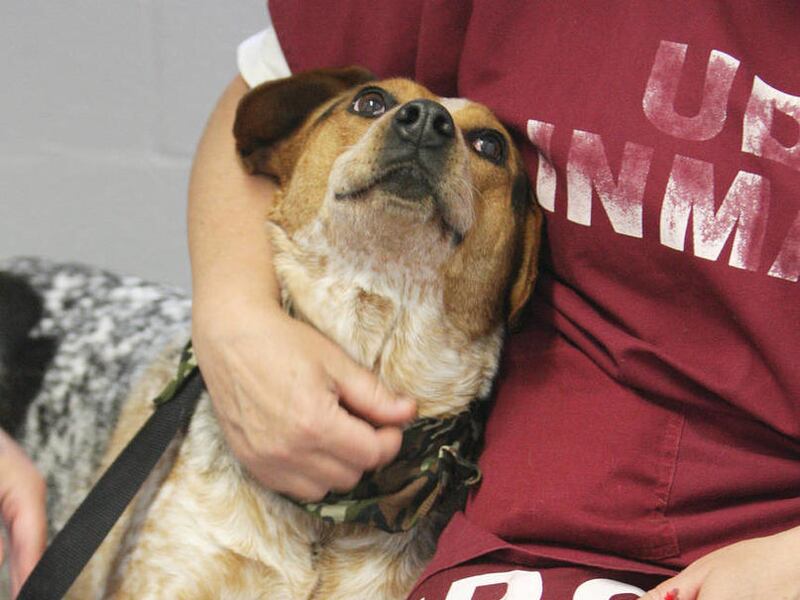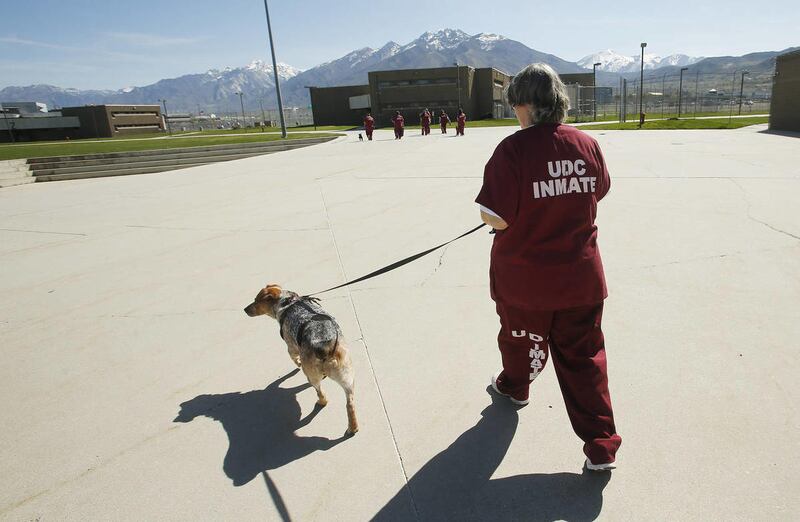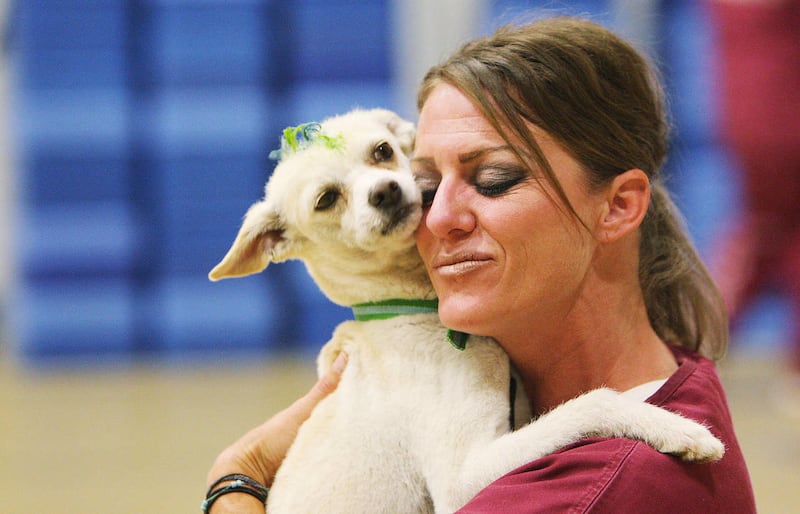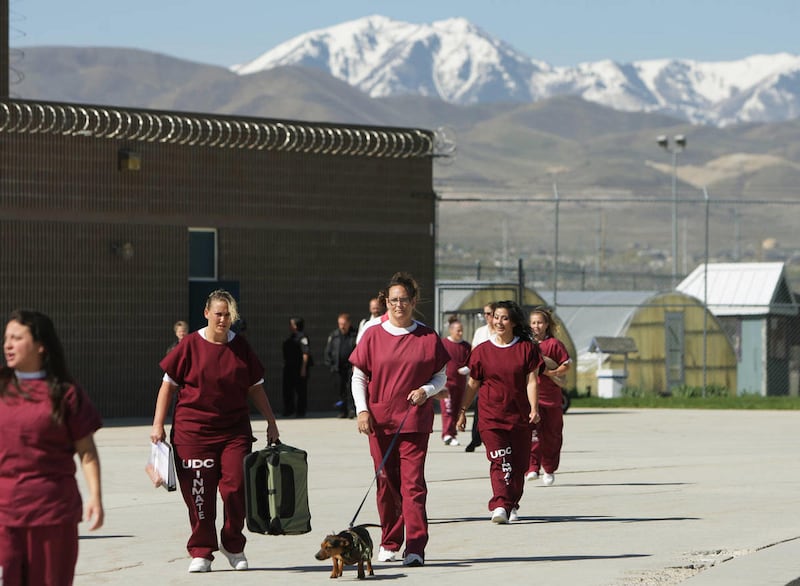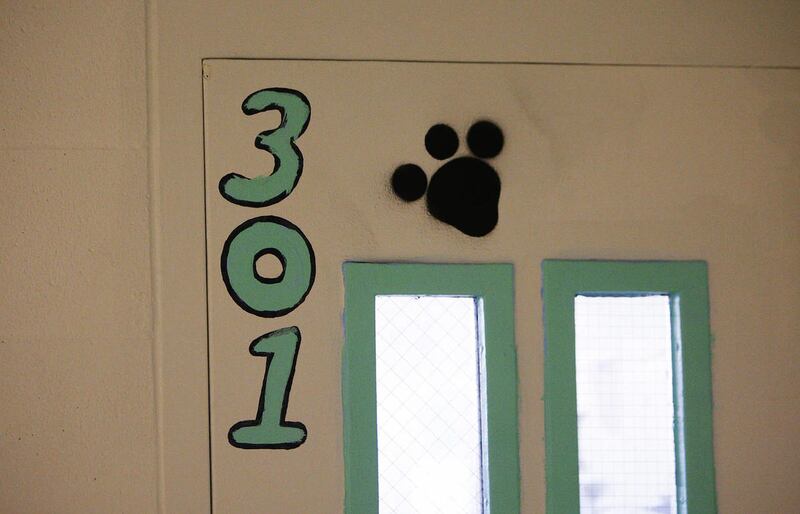It's changed the whole atmosphere here. The girls are calmer, there have been no fights since they arrived. It used to be so chaotic with all the arguing. Now there is a noticeable difference. – Valeen Sanchez, inmate
UTAH STATE PRISON — Jet is a formerly abused rat terrier-chihuahua mix whose personality has really changed for the better after spending his first week at the Utah State Prison.
A mohawk haircut, now dyed blue and green, "definitely gave him some confidence," said one of the dog's trainers, Reggie Peck, who is serving a sentence of up to 15 years for child abuse.
"It gives us something in here that is a very valuable service for someone else on the outside," she said. "At the same time, it lets us learn a new skill."
The dogs, who are some of the first non-official, four-legged creatures allowed at the secure facility, are being trained to provide assistance to Utah veterans, who sometimes don't have the focus to do the job themselves.
The program, made possible by a partnership between the prison and the nonprofit Canines With a Cause, puts six shelter dogs at the prison to be trained for about nine months. The arrangement helps the organization save thousands of dollars that it costs to train a therapy animal.
If it is successful, organizers hope to train more dogs there in the future.
"It's really healing for us to be able to love these little guys," said Cassandra Shepard, who is serving a life sentence for being party to the abuse and murder of a woman who had disabilities. "Staying busy is one of our main coping skills to combat the sorrow and remorse for our mistakes."
"All we've got is time," she said, adding that there is little to keep inmates "stimulated and motivated" in the mostly confined prison campus that boasts just a half-mile radius.
The dog-training program has become one of Shepard's "life lines," giving her a sense of purpose and hope.
"Hope is all you have to hold yourself together," she said, adding that it was an "honor" to be chosen to participate.
Of 143 women in one unit at the prison, only 20 were eligible to house and train the dogs under the facility's strict qualifications, which exclude anyone convicted with a sex offense or animal cruelty charge, as well as women who have exhibited misconduct at the prison in the past nine months.
Twelve women were selected to co-train the dogs and another three alternates were selected in case the original trainers couldn't complete the task, according to Lt. Tawnya Nicholes, who oversees one of the four female housing units at the prison.
"It has done a lot of good for their self-esteem and sense of self-worth," she said. "It lets them care about something more than themselves for a while."
The female inmates must organize their schedules to ensure proper care for the dogs, as well as attend twice-weekly training classes taught at the prison by Canines With a Cause staff members.
So far, the dogs respond to a tiny, handheld clicker, which helps each trainer teach the animal basic habits such as "sit," "stay" and "down."
It helps, however, that the "click" is followed up with a treat — a tasty chunk of a turkey hot dog.
"We want the ground work to be really strong," said Ph.D.-trained animal behaviorist Lynne Gilbert-Norton, who works with Canines with a Cause. "Hopefully these dogs will one day be responsible for a veteran, and they must be relied on to handle any situation."
Shelter dogs, she said, are more of a challenge to train than dogs that are typically bred for service or companionship, as many exhibit behavioral problems — an issue not too unfamiliar to some of the inmates.
"They've been through trauma and we've been through trauma, so we understand each other," Shepard said.
Gilbert-Norton spends a lot of time evaluating shelter dogs to ensure they are good candidates to become service dogs, as well as interviewing and observing the prison inmates prior to placing the dogs with them, to make the best match.
Dogs selected for the program must be friendly toward people and not aggressive in nature, "an all-around, sound dog," Gilbert-Norton said, adding that they've already exhibited progress.
"When we first brought these dogs in, they were bouncing around, you know, being dogs," she said. After more than a week with the women, "they're all pretty well-behaved. We're on track."
The lowly herd of dogs is having quite the effect on other inmates, too, said Valeen Sanchez, who was convicted on aggravated robbery charges that were enhanced because she was a member of a gang.
"It's changed the whole atmosphere here," she said. "The girls are calmer, there have been no fights since they arrived. It used to be so chaotic with all the arguing. Now there is a noticeable difference."
The compassion extends to some of the "hardest criminals, who just melt when they pet these dogs," said Brandi Lee Stilke, who is also serving up to 15 years in prison after her daughter was killed in a car accident when Stilke was driving high on drugs. She said Glory, a boxer-pitbull mix, has had a calming effect on her.
"Even the straight-faced officers seem to love it," Stilke said, adding that caring for the dog has brought her and her roommate, Sawsan Whitelaw, closer together.
"I'm not the type to show affection," Whitelaw said. Whitelaw is serving an indeterminate sentence for the abuse and murder of her 3-year-old daughter. "I have a hard time letting emotions out, but having Glory teaches me to give love freely."
Like Jet and Glory, each of the dogs is given a patriotic name or title related to military service, including Valor, Captain, Star and Liberty, to help recognize the service of and for their future owners.
"It's really a three-way win," Gilbert-Norton said. "The dogs, the veterans and the inmates all end up better off."
Email: wleonard@deseretnews.com, Twitter: wendyleonards




